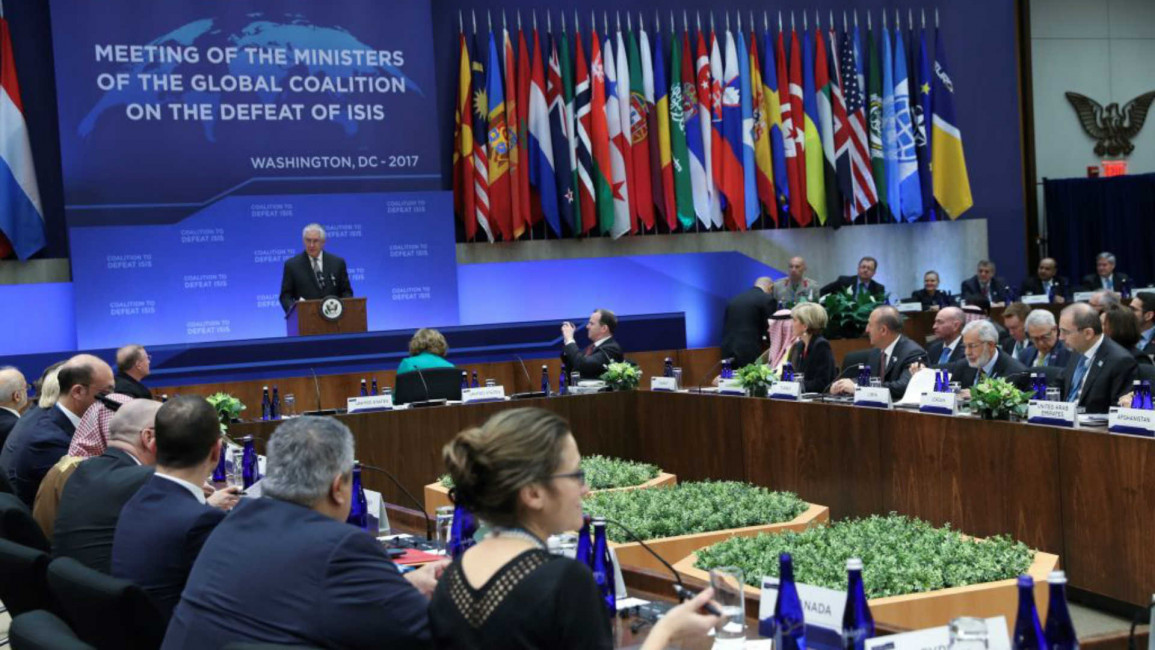
How successful is the anti-ISIS Global Coalition?
On 22-23 March 2017, the anti-ISIS coalition summit took place in Washington DC at the invitation of Secretary of State, Rex Tillerson.
Hailed the largest international coalition in history, the 'Global Coalition to defeat ISIS' consists of 68 member countries.
Established in September 2014 by the Obama Administration, the Global Coalition mission highlights commitment to "degrading and ultimately defeating Daesh" on all fronts employing five lines of operations, including military efforts, cutting off IS' financing, preventing the flow of foreign fighters, stabilisation of liberated areas, and countering the IS narrative.
The coalition was formed based on calls and UN Security Council resolutions such as UNSCR 2170 which states that "terrorism can only be defeated by a sustained and comprehensive approach involving the active participation and collaboration of all States… which is why our first priority is to encourage others to join in this important endeavor."
The 68 nations have contributed to both military and non-military efforts. Some countries have sent troops, weapons, and ammunition, participated in airstrikes, provided military bases, and contributed to training and equipping groups fighting IS.
Other countries supported the campaign through dropping aid packages, funding UN humanitarian efforts, and facilitating political efforts and intelligence sharing. Absent from the coalition are Iran and Russia, due to their ties with the Assad regime, which the US-led coalition wants removed from power.
A fact sheet released by US Department of State on 22 March 2017, lists the coalition's achievements in the fight against IS. The reports states that the operations have liberated 62 percent of previously IS-controlled terrain in Iraq, and 30 percent in Syria. Additionally, coalition operations have killed more than 180 IS leaders, including al-Baghdadi's deputies and ministers, and have targeted key facilities controlled by IS such as energy assets and cash storage.
 |
One of the notable challenges has been its inability to deter IS' reach |  |
On the civilian front, coalition members have spent more than $22 billion since 2014 on stabilisation efforts, demining, economic development, humanitarian assistance, and police training, in addition to networking and coordination of efforts to disrupt IS activities globally, traveler screening measures, and online counter messaging.
Following the global coalition's meetings, the ministers of the 68 members released a statement confirming their unity in fighting IS and "reiterating their commitment to an integrated, multidimensional, and comprehensive approach to defeat ISIS and its global networks".
Despite some advances against IS' territorial control in Iraq and Syria, and boasting of achievements by coalition members, the Global Coalition continues to suffer some setbacks and faces significant challenges.
One of the notable challenges has been its inability to deter IS' reach and ability to inspire and coordinate attacks in Europe and the US, such as those terror attacks committed since the founding of the coalition in Paris, Brussels, Nice, Berlin, San Bernardino, Orlando, London and elsewhere.
| Read more: Manufacturing an American Islam in the age of Trump | |
The second major shortcoming is the civilian humanitarian crisis. Just few days ago, as coalition forces were closing in on IS in Raqqa and Mosul, US-led airstrikes are believed to have killed over 200 civilians in Mosul, while hundreds of others remain trapped in the two cities.
Following these reports, Lt. Gen. Stephen Townsend - the top US commander for Iraq and Syria - said at the Pentagon, "If we did it, and I'd say there's at least a fair chance that we did, it was an unintentional accident of war,".
Amnesty International reported that such lack of precautions to prevent civilian causalities is a violation of international law. In addition, IS fighters are reported to be using civilians as human shields, while Iraqi forces torturing captured children and suspected IS members violate human rights principles including children's rights and the right to a fair trial.
 |
Human rights organisations and some monitoring groups suspected that President Trump has changed the rules of engagement as promised |  |
The large numbers of civilian causalities in Iraq and Syria recently have brought attention to the US military rules of engagement. Trump has previously criticized rules of engagement under the Obama Administration as too restrictive and promised to change them.
Human rights organisations and some monitoring groups suspected that President Trump has changed the rules of engagement as promised, giving lower-level commanders the ability to authorise airstrikes. However, the Pentagon insists that rules of engagement have not changed and modifications consisted of "only minor adjustments".
Lastly, countries participating in the global coalition to fight IS each have their own agenda. The most classic example is that of Turkey vis-à-vis the Kurds, as well as Arab gulf countries and the United States.
Among such challenges and violations of human rights and international law, President Trump's strategy against IS seems to be continuing President Obama's plans of focusing on developing local forces.
During the Global Coalition's meeting last month - the first under the Trump Administration - Secretary of State Rex Tillerson did not announce any new strategies and asked allies to contribute their equal share to forces in Iraq and Syria. Tillerson also promised the creation of "zones of stability" (not exactly safe zones) for refugees, which will increase US military presence on the ground.
While IS might be losing some territorial control, the US is continuing its failed strategy in fighting violent extremism globally.
As several factors, including marginalisation and restrictions on freedoms are known to be driving violent extremism, the Trump Administration and the Global Coalition continue to ignore dictators and repressive regimes across the region.
Dr. Tamara Kharroub is a Senior Analyst and Assistant Executive Director at Arab Center Washington DC.
Opinions expressed in this article remain those of the author and do not necessarily represent those of The New Arab, its editorial board or staff.



